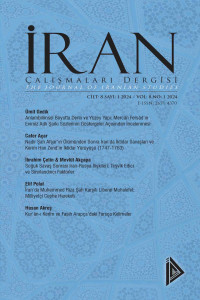Öz
In contemporary academic studies concerning post-revolutionary Iran, scholarly attention predominantly gravitates towards dissecting aspects such as foreign policy strategies, military endeavors, the intricacies of the nuclear program, and the socio-political dynamics. However, there exists a notable oversight regarding the comprehensive examination of the institutional framework that underpins the Islamic Republic. Hence there is a significant need to delve deeper into the state-bureaucratic attributes of the nation to gain a more holistic understanding of its governance mechanisms.
Anahtar Kelimeler
Öz
In contemporary academic studies concerning post-revolutionary Iran, scholarly attention predominantly gravitates towards dissecting aspects such as foreign policy strategies, military endeavors, the intricacies of the nuclear program, and the socio-political dynamics. However, there exists a notable oversight regarding the comprehensive examination of the institutional framework that underpins the Islamic Republic. Hence there is a significant need to delve deeper into the state-bureaucratic attributes of the nation to gain a more holistic understanding of its governance mechanisms.
Anahtar Kelimeler
Ayrıntılar
| Birincil Dil | İngilizce |
|---|---|
| Konular | Bölgesel Çalışmalar, Ortadoğu Çalışmaları, Uluslararası İlişkiler (Diğer), Çağdaş İran tarihi |
| Bölüm | Kitap Değerlendirmeleri |
| Yazarlar | |
| Erken Görünüm Tarihi | 29 Haziran 2024 |
| Yayımlanma Tarihi | 30 Haziran 2024 |
| Gönderilme Tarihi | 16 Mayıs 2024 |
| Kabul Tarihi | 31 Mayıs 2024 |
| Yayımlandığı Sayı | Yıl 2024 Cilt: 8 Sayı: 1 |
Creative Commons License
This work is licensed under a Creative Commons Attribution-NonCommercial 4.0 (CC BY NC) International License.
İran Çalışmaları Dergisi bilginin yayılması ve zenginleşmesi için Açık Erişim Politikasına uymaktadır.


